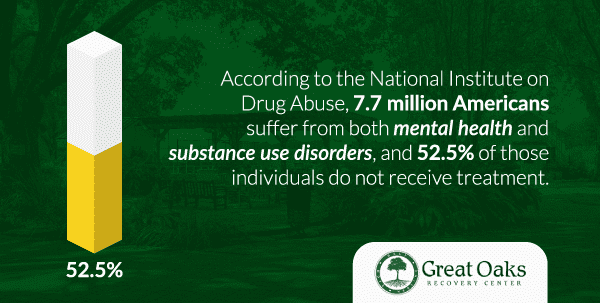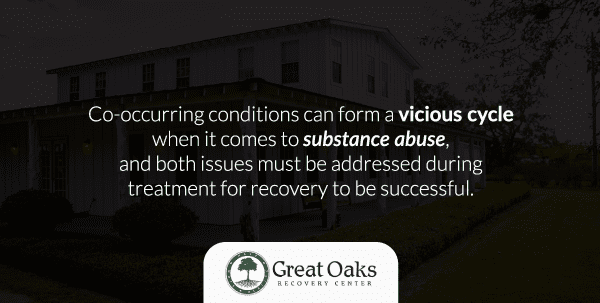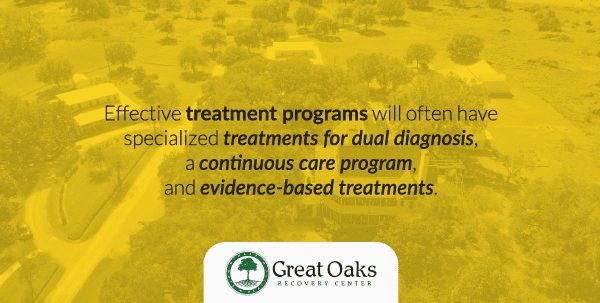What Is Dual Diagnosis?
Questions About Treatment?
Our knowledgeable team is ready to discuss your situation and options. Your call is confidential with no obligation required.
What Is a Dual Diagnosis?
Dual diagnosis frequently occurs in substance abuse and mental health rehab. Substance abuse, mental health issues, and other conditions can take a toll on someone’s life. Many who struggle with a mental illness may try to self-medicate by abusing addictive substances, worsening their mental health. Additionally, substance abuse can be the cause of developing a mental health issue. When someone struggles with both a substance use disorder and mental illness at the same time, it can create a variety of problems in that person’s life.
Fortunately for those struggling with co-occurring disorders, a dual diagnosis treatment program can help. Dual diagnosis rehab involves treating all co-occurring conditions that a client is struggling with simultaneously. Treating all co-occurring disorders at the same time leads to people getting the best possible results from their treatment program.

Dual Diagnosis Definition
The meaning of a dual diagnosis is when a person is medically diagnosed with a mental disorder and a substance use disorder. These two conditions can occur together frequently and worsen the symptoms of both disorders. Symptoms of this diagnosis can be serious, but a dual diagnosis treatment program can help a person recover and learn to manage their symptoms.1
How Common Is a Dual Diagnosis?
A dual diagnosis of mental health and substance use disorders is common. About half of all people with a diagnosable mental illness will also struggle with a substance use disorder and vice versa. Therefore, dual diagnosis treatment centers are crucial for the proper diagnosis, care, and treatment of those who struggle with both mental health and substance use disorders.
Dual Diagnosis Statistics
Dual diagnosis statistics show just how widespread and serious co-occurring disorders can be. According to the National Institute on Drug Abuse, 7.7 million Americans suffer from both mental health and substance use disorders. Of those 7.7 million people, 52.5% do not receive either mental health or substance use treatment. The top reasons people stated for not getting treatment were not being able to afford it and not knowing where to go for treatment.2
Therefore, education and sharing resources about rehab for dual diagnosis are so important. By making the right resources available, it is possible to find an affordable dual diagnosis program so those struggling can get the help they need.

Common Types of Dual Diagnoses
There are many common mental health conditions that can make someone more likely to struggle with a co-occurring substance use disorder. Knowing which conditions are more likely to lead to co-occurring disorders can help prevent and properly treat dual diagnosis symptoms.
The most common mental health conditions that have a high potential for co-occurring substance abuse are:3
- Attention-deficit hyperactivity disorder (ADHD)
- Bipolar disorder
- Borderline personality disorder (BPD)
- Depression
- Eating disorders
- Generalized anxiety disorder (GAD)
- Obsessive-compulsive disorder (OCD)
- Post-traumatic stress disorder (PTSD)
- Schizophrenia
While not everyone who struggles with one of these conditions will have a dual diagnosis, looking out for the signs and symptoms of possible co-occurring substance abuse can help prevent the negative effects these conditions have on someone’s life.
The Connection Between Mental Health Issues and Drug Abuse
Attention-Deficit Hyperactivity Disorder (ADHD)
When someone struggles with ADHD, they are more likely to abuse substances as a form of self-medication since many addictive substances can have calming effects that give the impression of helping ADHD symptoms at first. However, long-term substance abuse will only lead to more negative side effects that can worsen the symptoms of ADHD.
People who struggle with ADHD are also commonly prescribed stimulant drugs like Adderall to help with ADHD symptoms. Many of these stimulants can be very addictive if misused or abused, leading to many problems. It’s important for those struggling with ADHD to take medication with caution while following strict guidelines from a medical professional.
Bipolar Disorder
Those who struggle with bipolar disorder may be more likely to self-medicate with addictive substances. Bipolar disorder consists of emotional and manic symptoms that can take a toll on someone’s life. Taking addictive substances can seem to help manage these symptoms, but the addiction will lead to additional problems over time. In addition, the ups and downs caused by symptoms of bipolar disorder can lead to someone struggling to get out of common patterns of addiction.
Borderline Personality Disorder (BPD)
Studies have shown that two-thirds of people diagnosed with BPD struggle with substance abuse at some point in their life.3 Substance use can be a way to cope with how BPD makes someone think and feel about themself. Nevertheless, continuous substance abuse can lead to many negative effects that worsen the symptoms of BPD.
Depression
Self-medication with addictive substances is common for those who struggle with depression. Symptoms of depression can make someone feel very down or lethargic, causing them to want to use stimulant drugs to feel more energized or motivated. Someone with depression may also use depressant substances to numb the pain that they are feeling in their life. Any type of substance abuse can worsen symptoms of depression and create negative patterns in someone’s life that are difficult to break.
Eating Disorders
Those who struggle with eating disorders may deal with substance abuse. For example, many stimulant drugs can act as appetite suppressants which may seem like a beneficial side effect for those who struggle with eating disorders where they continuously feel like they want to lose weight. However, this can lead to many negative physical and mental health effects over time.
Many who struggle with eating disorders may also be trying to cope with some kind of pain or trauma where binge eating or self-image issues may occur. Substance abuse can be another way to cope with trauma and can lead to other negative behavioral patterns over time.
Generalized Anxiety Disorder (GAD)
Substance use can help make someone feel more calm or confident when dealing with anxiety. Nonetheless, self-medicating symptoms of anxiety with addictive substances is only a crutch that will not help treat the anxiety itself. Over time, frequent abuse of substances to deal with anxiety can lead to dependence on drug use to feel normal and worsening anxiety symptoms.
Obsessive-Compulsive Disorder (OCD)
OCD can lead to many habitual and compulsive behaviors that are hard for someone to control. The use of medication can help someone with OCD feel calmer and let go of compulsive actions. Unfortunately, though, abusing substances will only worsen OCD symptoms, and a tendency towards compulsive behavior can make it difficult to stop regular drinking or drug use.
Post-Traumatic Stress Disorder (PTSD)
Past trauma can often lead to substance abuse as a form of self-medication. Many who struggle with untreated PTSD symptoms may feel like alcohol or drugs help them forget or let go of past trauma. However, frequent abuse of substances can lead to addiction and many other negative effects on someone’s life that will worsen PTSD symptoms.
Schizophrenia
Schizophrenia is characterized by hallucinations and delusional thinking. Thoughts and behaviors due to symptoms of schizophrenia can lead to the misuse of substances as a way to self-medicate. Consequently, long-term substance abuse will lead to someone with schizophrenia feeling dependent on the substance to feel normal, and symptoms of addiction can worsen the delusional thoughts and behaviors that are common with schizophrenia.

What Is Dual Diagnosis in Disability?
The term dual diagnosis generally refers to those who struggle with both a mental health and substance use disorder; however, dual diagnosis can also occur in those who struggle with mental or physical disabilities.4
Those who struggle with mental or developmental disabilities can commonly struggle with mental health issues and substance abuse. Cognitive issues can make it difficult to diagnose mental health issues or symptoms of substance abuse since many of the symptoms may overlap. Mental disabilities can also make someone struggling with a dual diagnosis feel like what they are experiencing is normal, so they will be less likely to seek help.
Someone struggling with physical disabilities may also be more likely to develop a mental health or substance use disorder. Those struggling with physical limitations may be more prone to depression or other mental health issues due to negative life complications due to their condition. Those with physical disabilities may lean on substances to cope with negative emotions.
Co-occurring conditions in those struggling with disabilities can lead to many negative life and health effects that can worsen symptoms of the disability. A dual diagnosis treatment program can help those with dual diagnosis in disability recover and learn to cope with the many ways that disability, addiction, and mental health issues can affect someone’s life.
Dual Diagnosis Symptoms
It isn’t always easy to determine if someone is struggling with mental health issues and substance abuse at the same time. Many of the symptoms can overlap, which makes it vital for treatment centers to have the proper procedures and treatment methods in place to determine if someone has a dual diagnosis. The best dual diagnosis treatment centers will be able to effectively diagnose and treat clients for all conditions they are struggling with simultaneously.
Symptoms of Mental Health Disorders
There are many common symptoms that can help determine if someone may be struggling with a mental health disorder. Common symptoms of mental health disorders include:5
- Confused thinking or trouble concentrating
- Delusions, paranoia, or hallucinations
- Excessive feelings of fear, worry, or guilt
- Feeling sad or down
- Feeling withdrawn from social activities
- Low energy
- Mood swings
- Problems coping with stress
- Significant changes in eating
- Trouble sleeping
While mental health disorders and substance abuse have a lot of overlap, just because someone may be experiencing these symptoms or struggling with mental health issues does not necessarily mean they will have a dual diagnosis.
It is essential to watch for signs of both conditions to help determine if someone needs help. A dual diagnosis treatment facility can help determine if a client is struggling with both mental health and substance abuse and create a plan that will fit an individual’s needs.
Symptoms of Substance Use Disorder
Substance use disorders can affect someone’s life in many ways, and there are many common signs that someone may be struggling. Common symptoms of substance use disorders include:6
- Continued drug use despite its negative effects
- Experiencing withdrawal symptoms
- Failed attempts to stop taking a drug
- Feeling the need to use a drug regularly
- Intense urges to use a drug to block out other thoughts
- Taking a higher dose to receive the same effect
- Partaking in risky activities
- Problems at work or school
- Relationship problems
- Spending money on drugs even when they can’t afford it
- Taking prescription medications for longer than intended
- Withdrawing from social activities
Substance use disorders can have many negative effects on someone’s life, including mental health issues. A dual diagnosis service can help determine if someone is struggling with a substance use disorder and any other underlying conditions.
General Warning Signs of Dual Diagnosis
If you think you or someone you know may be struggling with both a mental health and a substance use disorder, there are some common signs you can look for. General warning signs of dual diagnosis are:
- Having trouble stopping drug or alcohol use because their mental health becomes worse
- Often exhibiting erratic behavior, irritability, or insomnia
- Periods of extreme emotional highs and lows
- Signs of mental health issues before the addiction started
- Using drugs and alcohol to feel more in control of their actions, thoughts, or emotions
- When trying to quit alcohol or drug use, they feel more depressed
If someone exhibits these signs, they may be struggling with a dual diagnosis. A treatment center can help determine if you or someone you know has a dual diagnosis and create a personalized dual diagnosis rehab plan.
Dual Diagnosis Treatment
There are many treatment options available that can help. Dual diagnosis residential treatment can be a good option to recover from substance abuse and mental health disorders successfully.
The Issue with Drug Abuse
How To Find the Right Treatment Program
To get the best results, find a dual diagnosis residential program that fits your needs. Typically, an effective program will have the following offerings.
- Longer treatment: Treatment for a dual diagnosis is more complicated and will usually require a longer treatment duration. The typical thirty-day treatment programs used to treat substance use disorders or mental illness on their own won’t be as effective for a dual diagnosis. Instead, sixty to ninety-day programs have shown to be the most effective for treating clients with a dual diagnosis.
- Specialization: Look for programs specialized in treating clients with a dual diagnosis. Ensure that treatment professionals possess the right certifications and credentials to treat both mental health and substance use disorders properly.
- Full continuum of care: The best dual diagnosis treatment centers will offer a full continuum of care that helps people transition back into everyday life after treatment. It often includes transitional housing, creating a plan for long-term success, coaching, and continued therapy.
-
- Evidence-based treatment: Treatment centers specializing in dual diagnosis should use evidence-based treatment practices. Using treatment methods that are based on significant studies and scientific evidence will ensure that you get the best results.
-
- Variety of treatment options: Dual diagnosis inpatient treatment centers should help create a program designed to fit your needs. Treatment centers that offer a variety of treatment options will provide the best results.
Dual Diagnosis Self-Help
In addition to receiving dual diagnosis residential treatment, there are things you can do on your own that will help with the recovery process. Focusing on healthy activities like diet, exercise, and meditation can get your mind and body in a better place and create a healthy structure within your life. Other positive activities such as volunteering or getting involved in the community can be good ways to surround yourself with positive people and find more positive activities to partake in.
Dual Diagnosis Self-Medication Dangers
While there are some healthy ways to help with a dual diagnosis on your own, you should avoid any kind of self-medication. Self-medicating with substances can lead to various negative consequences and won’t help build healthy skills to cope with the stresses of life. Self-medicating will only worsen the symptoms and create dependence on substances to feel like you can function normally.
Support Groups
Dual diagnosis group therapy and support groups have shown to be effective parts of treatment programs. Support groups provide a sense of community and allow group members to share their experiences as they work towards a common goal.
Life After Treatment
After completing dual diagnosis residential treatment, some form of aftercare should be used to help ensure continued progress and support. Continuing to meet with a therapist or joining a support group can be beneficial in ensuring continued structure and care after treatment.

Great Oaks—Houston Dual Diagnosis Treatment Center
If you are looking for dual diagnosis treatment in Houston, Texas, Great Oaks Recovery Center can help.
Dual Diagnosis Treatment Program at Great Oaks
Great Oaks Recovery Center ensures that all clients receive high levels of care through evidence-based treatment methods. The knowledgeable health care providers at Great Oaks will help assess your condition and create a program that is designed to fit your needs.
Detoxification
Detox is one of the first steps when treating substance use disorders. Withdrawal symptoms are likely during this time of treatment, so Great Oaks offers around-the-clock care and support to make the detox process as comfortable as possible.
Residential Treatment
Great Oaks offers residential treatment options that can be beneficial for long-term dual diagnosis treatment. Residential treatment will create a structured environment away from temptations. The supportive staff at Great Oaks will provide you with high levels of care and support, so you don’t have to go through the recovery process alone.
Family Program
Great Oaks also offers a family program to help you create a solid support system. Family therapy can help educate and support the well-being of family members affected by the dual diagnosis as well.
Ready-To-Work Program
The ready-to-work program at Great Oaks will help you create a long-term plan for success that includes getting back to work or finding a job that is suitable for your skillset. This can be a great way to get back on your feet after completing a recovery program.
Continuing Care and Alumni Support
Great Oaks offers continuing care and support to everyone who completes their recovery program. This helps create long-term success and provides a support system for any bumps along the road after treatment has been completed.
Resources
- https://medlineplus.gov/dualdiagnosis.html
- https://www.drugabuse.gov/drug-topics/trends-statistics/infographics/comorbidity-substance-use-other-mental-disorders
- https://www.ncbi.nlm.nih.gov/pmc/articles/PMC6145127/
- https://www.socialworktoday.com/archive/092310p6.shtml
- https://www.mayoclinic.org/diseases-conditions/mental-illness/symptoms-causes/syc-20374968
- https://www.mayoclinic.org/diseases-conditions/drug-addiction/symptoms-causes/syc-20365112
Questions About Treatment?
Our knowledgeable team is ready to discuss your situation and options. Your call is confidential with no obligation required.

